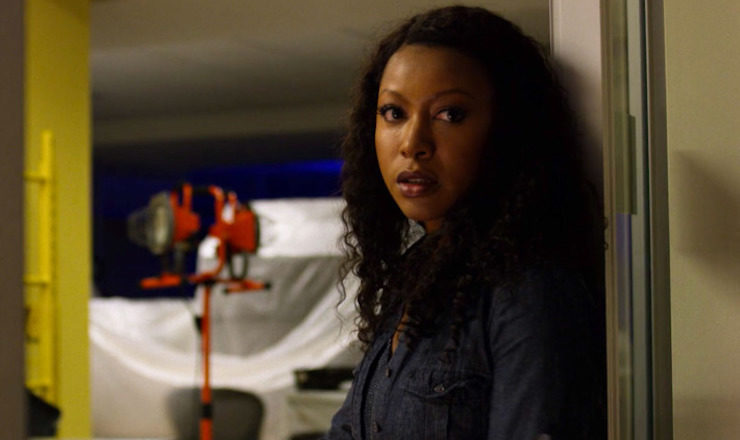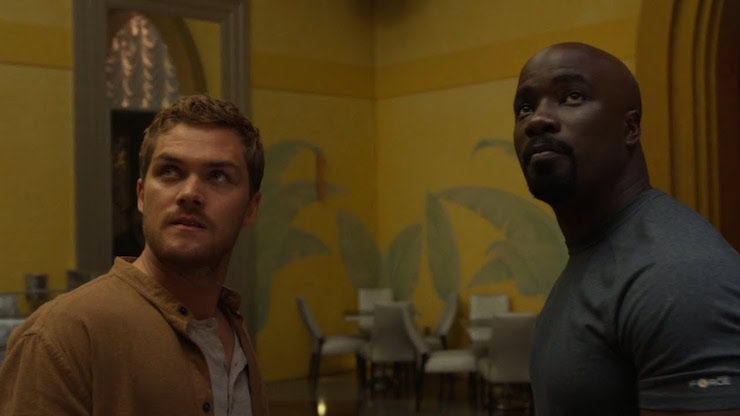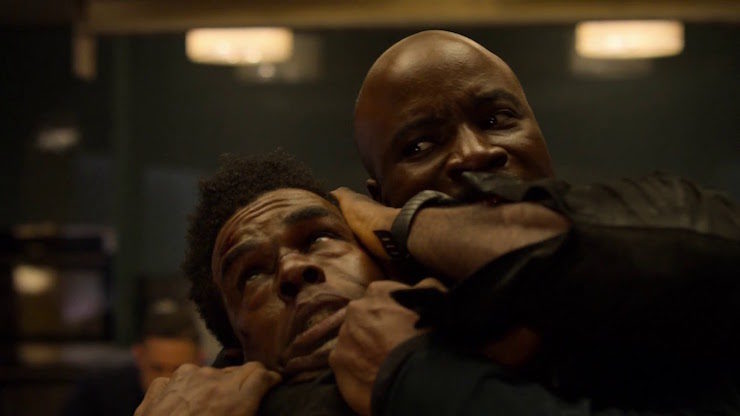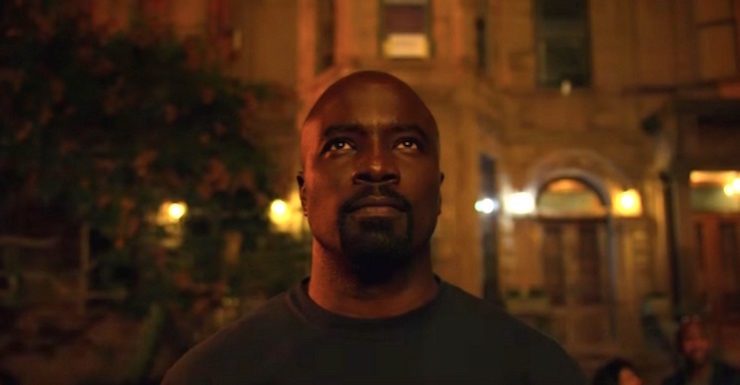One of the issues with pretty much all of Netflix’s Marvel offerings is an inability to come up with stories to fill thirteen episodes. The Punisher‘s inaugural season was the first one to really feel like it earned the whole baker’s dozen with its storyline, and Jessica Jones season two dealt with the problem by having several smaller plots instead of one big one.
Having finished the second season of Luke Cage, I look back and see a strong season with no draggy parts (which plagued season one) and no major missteps (like killing Cottonmouth and replacing him with Diamondback). It wasn’t perfect by any means, but it overall worked better than most.
(Check out my reviews of episodes 1-4 and of episodes 5-8.)
SPOILERS for the various Marvel Netflix shows in general and all of Luke Cage season 2 in particular
First of all, I want to talk about the first two episodes in the final third of the season, because they particularly stood out for me as individual episodes.

Episode 9, entitled “For Pete’s Sake,” is directed by the great Clark Johnson. Best known in front of the camera as Detective Meldrick Lewis on Homicide: Life on the Street, Johnson has become one of the finest TV directors extant. He lensed the pilot episodes of both The Wire and The Shield, the two best cop dramas of the 21st century, and he did an amazing job with this episode which has two conversations that have been building for the previous eight episodes as well as a superb action climax.
Cage and Misty are hiding Mariah, Tilda, and Reverend Lucas from Bushmaster, who has put out a bounty on their heads. This gives Cage and his dad a chance to finally have the talk that Claire spent several of the first few episodes bugging him to have, and Mariah finally comes out and tells Tilda the whole truth about her conception.
The former is fairly low-key, and not a hundred percent successful, but it’s sold on the power of Mike Colter and Reg E. Cathey’s respective charisma. (It’s also hard to get too worked up about it knowing that this was Cathey’s last role before he died. The season is dedicated to him at the end of episode 13.)
The latter, though, is where the episode sings. One of the themes of this season, beyond the ones I mentioned in my review of the season’s first third, is that of having everything slowly taken away from you and how you respond to it. It happens to Cage early on when he loses Claire and Fish. It happens to Shades when he’s forced to kill his best friend and everything falls apart. And it happens to Mariah as Bushmaster takes her money and support, the NYPD takes her freedom, and she herself drives away both Shades and Tilda. Mariah has danced on the line between her need to have her daughter in her life—originally done to improve her political career, though that was irreparably damaged by Bushmaster’s heads-on-spikes act at Family First!—and the truth, and the truth finally wins in a tour de force of pain and anger from Alfre Woodard, as for the second time in this series she re-lives her rape at the hands of her uncle. The last time, it ended with Cottonmouth’s death at her hands, and this time it ends with Mariah picking up a gun and firing her way out of the Rand facility when Bushmaster attacks.

That attack is beautifully done, the third-best choreographed fight scene this season, from Cage’s relaxed strength to Knight’s bionic-arm-aided badassitude to Mariah with a big fucking gun. Bushmaster learns where they’re hiding from Nandi, whose slide into corruption is a little too fast, but I like the fact that when she’s captured in episode 10, she’s chartering a private jet and dressed in a way nicer outfit than she’s ever worn at the precinct. Elsewhere in the same episode, Cage points out to Danny Rand that the real power is money, and that power corrupts Nandi something fierce. This isn’t Scarfe who’s been corrupt for ages, this is a working cop who’s had three million dollars dangled in front of her face and can’t pass it up.
That’s the B-plot of that tenth episode, though, while the A-plot of “The Main Ingredient” is the backdoor pilot for the Power Man & Iron Fist TV show I’ve been wanting since roughly 1982 or so. Colter and Finn Jones continue the excellent chemistry they showed in The Defenders, and I like the fact that the only person who seems actively committed to the notion of Rand, Jessica Jones, and Cage carrying on protecting the city in honor of Matt Murdock’s sacrifice is Rand.
What I especially love about “The Main Ingredient,” though, is that, for the first time since I watched Iron Fist’s first episode, I feel like I’m watching Iron Fist. Episode scripter Akela Cooper actually understands kung fu, and understands the character of Danny Rand as he’s been written in four-color form since 1973. I saw more knowledge of Zen teachings and martial arts philosophy in this hour of Luke Cage than in thirteen hours of Iron Fist’s first season. Plus, we’ve got the best fight scene this season as Cage and Rand take on the thugs at the grow-house. The whole thing is worth it for “patty-cake.” Can Cooper maybe show-run Iron Fist season two?

The best scene between the two is at the Carl Schurz Monument statue in Morningside Park when Rand tells him that there’s power in stillness. Cage comes back to that statue, with its magnificent view of Harlem, twice more during the series trying to take Rand’s advice—which was also Claire’s advice early on. Cage is less angry after punching a wall and losing Claire, but the anger’s still there, just bubbling more beneath the surface. Rand—providing verbal lessons the character showed no evidence of having learned himself in his own series, but whatever—reminds him that anger is the enemy of focus and he’ll never be able to make peace in Harlem if he can’t make peace with himself.
Best of all is that Rand came to check on Cage because Claire sent him. She doesn’t feel safe around him—seriously, she’d be justified in never coming near him again—but she does still love him and so sends Rand. (Really the only option among the other Defenders—no way she’d send Jones, they have too much baggage, and they all think Murdock is dead. Though I personally would rather she’d have called Colleen Wing, but that would deny us the Power Man & Iron Fist hits.)
Of course, by the top of episode 11, Rand has disappeared without explanation (beyond “we only hired Jones for one episode,” anyhow), and Cage is left on his own to stop Mariah and Bushmaster. But Cage tries to put Rand’s advice to good use, and he is more noticeably focused in the final three episodes.
However, among the three primary characters, it’s actually the other two besides Cage who need Rand’s advice more. Bushmaster’s anger toward the Stokes family—finally explicated in flashbacks in “The Creator,” as we learn that Mabel Stokes killed Bushmaster’s mother in a fire rather than give her a fair share of Harlem’s Paradise—leads him to take bigger and bigger chances with the nightshade-based cocktail that has combined with a vaccine from his youth (one that killed everyone else given it) to make him super-strong. While Cage and Knight are unable to actually stop Bushmaster, they do keep him from killing Mariah, and his crash from that leads to him stumbling, defeated, back to Jamaica.

It’s left to Tilda to deliver the final blow. She learns the truth about what the Stokes family did to Bushmaster, but more to the point, she finds out that Mariah herself shot everyone in Gwen’s and burned Bushmaster’s uncle Anansi to a crisp. Mariah, in fact, gloats to Tilda about it. That is the final straw for Tilda, and leads to her poisoning Mariah when she visits her in jail.
It’s also the final straw for Shades, but for a different reason. He’s not thrilled with the killing of innocents, and he’s right as far as that goes. Criminals killing criminals doesn’t get you much attention from the press or the police, but criminals killing innocents is a whole ‘nother thing. Mariah indiscriminately killed everyone in Gwen’s—including the domino-playing Greek chorus that I so adored from episode 3 (rest in peace, cranky old men)—and that’s a step too far for Shades.
But it’s only part of the problem. There was one survivor of that massacre, Bushmaster’s aunt, and Shades tracks her down, but can’t pull the trigger. Having to kill his best friend has broken him. He can’t be a gangster anymore, and he can’t be the chief advisor to royalty anymore, because Mariah has stopped taking his advice.
So he turns himself in, but even then he can’t get it right. He’s too in love with his lifestyle to be anything other than a dick when he’s making his statement, going so far as to alienate his lawyer (whose son was in Pop’s when Tone shot it up back in season one and is only alive because of Cage). That proves problematic for him, as Knight coerces him into going into Harlem’s Paradise wearing a wire (something a lawyer probably would’ve at least negotiated) and he’s later arrested because his deal was contingent on Mariah being convicted, a deal that evaporates after Mariah dies in prison at her daughter’s hands. (That’s the only misstep Mariah makes, as she’s just as powerful in prison as out of it, still manipulating things, still making herself the queen of all she surveys. And in the end, she gets in one final victory by bequeathing the club to the hero rather than her daughter, giving Cage power he probably won’t be able to handle and also denying her murderer, Tilda, her birthright.)

However, Shades is still, at heart, Harlem’s Wormtongue, adjoining himself to whoever he thinks will be the strongest—and by the end of season two, that’s Luke Cage, whom he urges to become Harlem’s king. Mariah has willed him Harlem’s Paradise, and Cage has managed to broker a peace among the various criminal empires looking for a piece of Harlem with Mariah out of the way. Both D.W. and Knight caution him against this, but Cage is counting on them to continue to keep him honest.
Will he find power in stillness as Rand advised, or will power corrupt him as it did Mariah and Cottonmouth and Bushmaster and even Nandi? Will being in bed with criminals make him into one?
These are all questions for season three. (For the record, if Annabella Sciorra is one of the big bads of season three as Rosalie Carbone, I’m totally on board with that as Sciorra is one of my favorite actors, one who is greatly underappreciated. The character originated in Punisher comics, so hey, we could get Frank Castle in season three!) Season two, however, gives us a fascinating story about family, about consequences, about anger, and about how you respond to everything being taken away from you. Sometimes you win (Knight thriving in her job and now with a badass bionic arm). Sometimes you lose (Bushmaster broken and retreating to Jamaica, Mariah dying in prison). And sometimes it rains (the jury’s still out on Cage’s new status quo).

So when the heck is season three gonna start? How about now?
(And seriously, guys, Daughters of the Dragon series. The second-best-choreographed fight scene this season is not enough…)
Keith R.A. DeCandido will be a guest at ConnectiCon XVI in Hartford, Connecticut this weekend. He’ll be at the Bard’s Tower booth selling and signing his work, and also might be on a panel or two. Come on by and say hi!










